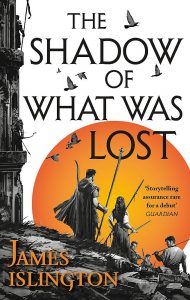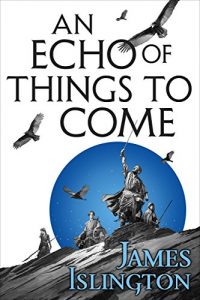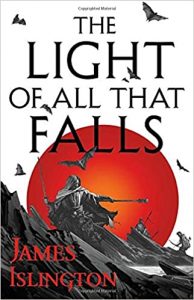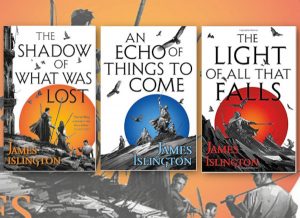THE LICANIUS TRILOGY by James Islington (BOOK REVIEW)
A GREAT DIVE INTO FANTASY
 The Licanius Trilogy by James Islington is an adventure fantasy trilogy published by Orbit Books. Book One, The Shadow of What was Lost, introduces our lead protagonist, Davian who discovers he is an Auger in a prejudicial world, twenty years after the war that overthrew the Augurs and their followers. This simple premise sets into motion a series of events that feel wholly familiar to fantasy readers whilst delivering on twists and turns throughout the story.
The Licanius Trilogy by James Islington is an adventure fantasy trilogy published by Orbit Books. Book One, The Shadow of What was Lost, introduces our lead protagonist, Davian who discovers he is an Auger in a prejudicial world, twenty years after the war that overthrew the Augurs and their followers. This simple premise sets into motion a series of events that feel wholly familiar to fantasy readers whilst delivering on twists and turns throughout the story.
Islington’s story begins its pacing with the classic adventure archetype seen in many fantasy novels throughout the years. Whilst it would be easy to say this is another work inspired by Tolkien, Islington’s prose and pacing harkens closer to more modern and contemporary authors of the genre. Rather than using Tolkien as a comparison point, it would be more accurate to say that The Licanius Trilogy draws more inspiration from authors like Robert Jordan with its world design, and Jim Butcher or Brandon Sanderson with its direct prose style.
The contrast of the rich world with the steady, streamline prose is one that pushes the reader forward at a fast, slick pace. Whilst reading the books is as smooth as butter, it is Islington’s use of drama that further pushes the reader to turn its pages. From the jump, Islington describes a familiar picture, yet within the first one hundred pages, he takes characters in directions that readers of fantasy would not have seen coming so soon. The first case of this being, Chapter Five, Book one. Seriously, it is the first jaw-dropping plot point introduced into the series and entices the reader to crave the chapters told from this character’s point of view. Islington further expounds on drama in ways akin to suspense, thriller novels. There are times where the reader will be asking, well who is telling the truth and who is lying? All while feeling sympathy for the character who has found themselves in this seemingly ever-tangled knot.
The forward moving momentum of the Licanius Trilogy can also be seen in the way in which its lore is handed to the reader. The Shadow of What Was Lost sets up mysteries and plot points delivered almost straight away or early on in the subsequent book. The age old benchmark of having to read through hundreds and hundreds of pages for the ‘good stuff’ is gone here. The reader is given rewards almost consistently, avoiding ‘slogs’ commonly seen in many fantasy stories. It helps that the format of the story is a trilogy which demands momentum from the writer in order to create a satisfying conclusion.
The type of story told also seems to be strongly influenced by the author’s perspective to approach the genre with a contemporary take on literature. Yes, there is a much faster pacing than typically seen in fantasy books for adult audiences, but there are also new elements within the story otherwise not typically seen in fantasy. Whilst the story starts off with the typical tropes of boy gets sent on adventure filled with twists and turns, soon afterward, the reader is introduced to the element of time travel!
 Historically, the prospect of time travel in stories is either met with a heedful groan, or an intrigued gasp. However, the element of time travel is notably not often used in fantasy stories, making its inclusion within The Licanius Trilogy all the more noteworthy. And it is to the trilogy’s praise that it understands the intricacies of bringing an element such as this into one’s story. The concept, though seen in an active role in the first book of the trilogy, does take something of a backseat in book two, An Echo of Things to Come, reclaiming prominence in the final book of the trilogy, The Light of All That Falls.
Historically, the prospect of time travel in stories is either met with a heedful groan, or an intrigued gasp. However, the element of time travel is notably not often used in fantasy stories, making its inclusion within The Licanius Trilogy all the more noteworthy. And it is to the trilogy’s praise that it understands the intricacies of bringing an element such as this into one’s story. The concept, though seen in an active role in the first book of the trilogy, does take something of a backseat in book two, An Echo of Things to Come, reclaiming prominence in the final book of the trilogy, The Light of All That Falls.
However, the book is still ripe with familiar elements to those who love the fantasy genre-magic, prophecies and fantastical creatures. The magic presented in this trilogy is known as Essence, a white stream of energy that can be manipulated by those who are Gifted. Other than the Gifted are the Augurs, mentioned above. Augurs possess abilities that vastly surpass the Gifted’s ability to wield Essence, with the inclusion of being able to use the magic itself. In addition, Augurs possess the ability of precognition, which the author ties into the plot point of time travel, blending the sci-fi and fantasy elements together.
As the story is contained within three books, character development and conflict escalation occurs with an ease that is worthy of applause to the author. Yes, one expects the main characters to become more and more powerful. Yes, one expects new mysteries and revelations to be brought to light. But the way in which Islington handles these landmark sequences avoids feeling contrived and wholly out of place. It’s interesting that as the reader continues on with the story, and more emphasis is placed on each main character, the way in which they become intertwined becomes an intriguing plot point in itself.
Notably, in book two, An Echo of Things to Come, the main female protagonist, Asha, encounters a woman named Isiliar. The woman, found somewhere out-of-place, is described as beautiful but the reader then quickly realizes this character is not wholly in her right mind. It is quickly discovered that she is a homicidal maniac, whose erratic disposition was due to her entangled past with one of the other main characters of the trilogy. Whenever Isiliar is on the page, the reader’s attention is immediately drawn. The author makes her a force to be reckoned with and even if the woman is just known to be in another room, the reader will find themselves gripping the book tightly, afraid for the protagonist who has to face her.
It is astounding the amount of depth found within just three books. Yet the point that garners this series much praise presents itself as a double edged sword-that being, this series is a trilogy.
This is because as a trilogy there is a pressure for the author to wrap up as many loose-ends as possible within the pages of these three books. Once the reader arrives at Book 3, The Light of All That Falls, one quickly begins to wonder if there are enough pages to accomplish the pay-offs warranted by the story told. To the author’s credit, he does follow-through on all the promises he has made to the reader since Book 1 of the trilogy. There are battles and sequences that go above and beyond those presented in the previous book and many itches the reader may have, do end up being scratched. However, there is still a want for more.
 Whilst this can be taken as a good thing, for the most part, that is entirely subjective. It was argued that for the sake of the book and its pacing, a large chunk of the book was cut out. The author notes that to focus on all new elements following certain characters, so late in the story would only hinder the momentum and pacing established already, which may create an awkward product. However, that sense of awkwardness still makes its way into the latter pages of the book, due to this decision. In addition, it brings with it more questions that are not given enough pages to be answered. Thankfully, it does not impact greatly on the larger plot as a whole, rather a small blemish on an otherwise smooth epidermis. Yet, as an epic fantasy reader, the audience thrives on world-building, digging into new cultures and magic-systems in itself. Thus it can argued that it was a disservice to not include these portions that were cut out. Instead of feeling teased by what was given in those pages, the reader is left feeling slighted.
Whilst this can be taken as a good thing, for the most part, that is entirely subjective. It was argued that for the sake of the book and its pacing, a large chunk of the book was cut out. The author notes that to focus on all new elements following certain characters, so late in the story would only hinder the momentum and pacing established already, which may create an awkward product. However, that sense of awkwardness still makes its way into the latter pages of the book, due to this decision. In addition, it brings with it more questions that are not given enough pages to be answered. Thankfully, it does not impact greatly on the larger plot as a whole, rather a small blemish on an otherwise smooth epidermis. Yet, as an epic fantasy reader, the audience thrives on world-building, digging into new cultures and magic-systems in itself. Thus it can argued that it was a disservice to not include these portions that were cut out. Instead of feeling teased by what was given in those pages, the reader is left feeling slighted.
Interestingly, throughout each book, Islington’s growth in his craft could be seen on the pages, as he becomes a stronger writer. And it begs the question that those chapters could have been handled well within the final book of the series although it would have warranted the need for a fourth book. Which, given the building blocks already set down, is a more enticing prospect than a wearisome one .
The Licanius Trilogy manages to make itself something of its own and truly does outshine its flaws. It proffers one of the most interesting and thought provoking endings fantasy readers will come across and brings with it nail-biting twists and turns, always making the reader eager to get to the next page. James Islington highlights that not only is he a capable writer, but he has a prowess which shows an understanding of the anatomy of a fantasy book and how to keep it enticing. He shows that he understands the history of fantasy stories told before and what makes them all special and captivating. Islington’s combination of knowledge and talent makes him an author one should definitely check out and The Licanius Trilogy, a series worth one’s time.


I guess I read a different series by a different author. I found this series confusing, pompous and in many places incomprehensible. Characters come and go and hundreds of pages latter, reappear and the reader is suppose to remember and care about them. At over 2200 pages, it needed a sharp edit. I had to force myself to finish the final 500 pages but I did since I invested so much time in it but I could have stopped anytime and not been sorry. Final verdict: don’t bother!
Great review Craig. I look forward to more from you. Della